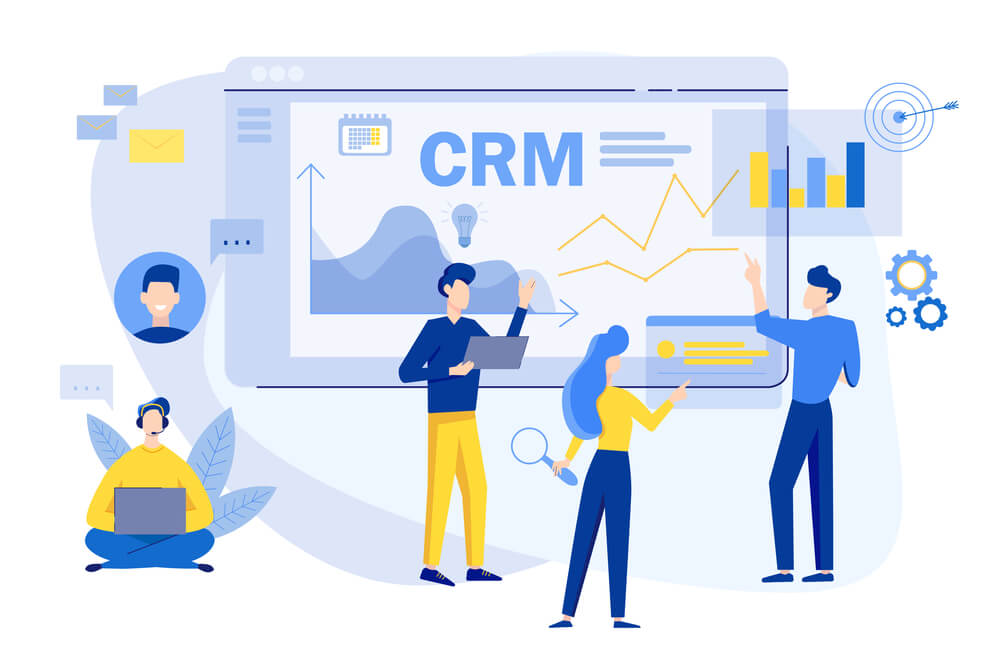Customer Relationship Management (CRM) tools offer many valuable functions for businesses and organizations. They improve informational organization, enhance communication, improve customer service, and improve analytics and data reporting. Above all, CRM platforms allow you to automate daily tasks, significantly improving general efficiency. A more efficient organization is a more profitable organization.
The big challenge, however, is picking the right one for your organization. There are several dozen CRM platforms on the market, each boasting unique features. Although the majority will still deliver the above benefits, they vary significantly in ease of use, mobility, automation capabilities, and hosting. It can make the selection a headache, especially if it’s your first time shopping for a CRM.

Comparison of the top 7 leading CRM platforms
The following is a detailed comparison of the seven of the best CRM platforms to make your job a little easier;1. Salesforce
Salesforce is one of the most popular CRM, globally. It offers excellent customization, as it functions on the principle that a business may grow or shrink over time. The result is immense flexibility that allows for faster searches, efficient automation, and hassle-free internal client management.Pros
- It’s an all-in-one cloud platform
- Easily keeps up with business growth
- Affordable options for small businesses
- Very easy to learn and use
- Supports sales forecasting and lead generation
- Excellent mobility
- Great social media support
Cons
- Salesforce is predominantly B2B, not B2C
- The complete package is pricey
- Complex when starting out
2. ZOHO CRM
Another excellent option when shopping for a tried-and-tested CRM, ZOHO is even easier to learn, and fits small businesses well. That doesn’t mean that it’s simplistic. ZOHO is still one of the most robust CRM platforms, boasting a wide breadth of solutions for managing customer support, tracking the sales funnel, creating email campaigns, and other marketing functions such as collaboration and project management.Pros
- Free for the first 10 users
- Streamlines notifications
- Exceptional email tracking
- Supports lead generation and scoring
- Multiple third-party integrations
- Has an API for building custom apps
Cons
- The user interface is clunky
- Calendar functions are limited
- Integration with other email services is limited

3. HubSpot CRM
Founded in 2006, the HubSpot CRM is arguably the best free CRM. Even better, HubSpot doesn’t require that you make changes to your current workflow. You don’t need the extensive customizations common with other CRMs. It’s a great option for those who are just getting started in the world of CRM platforms. Unfortunately, this simple structure also means that HubSpot may not be a great tool for advanced enterprises requiring more help from their CRM software.Pros
- It’s FREE to use
- Excellent support for inbound marketing
- Great for customer service
- Has a friendly user interface
- Provides useful insight
- Pre and post-sale data tracking
Cons
- No CC on emails
- No stand-alone analytics tool
4. Zendesk.com
You might be aware of Zendesk, the customer support tool from back in the day. Well, now the company also offers a CRM solution. What makes them a great option is their size. Zendesk is a large company with a global presence. Secondly, Zendesk, as a company that also offers customer support services, is very customer-oriented. They know what the customer wants and what businesses should do to boost loyalty and sales.Pros
- Works as a contact database and support tool
- Easy, fast setup and implementation
- Integrated channel support
- Makes use of (customizable) knowledge bases
- Has a unique support ticketing system
Cons
- It’s more of a customer support center
5. Monday.com
Monday.com is more like a team and project management platform. It currently serves over 100,000 small businesses. As a project management tool, it allows you to track tasks and manage deadlines. The platform also offers several collaboration functions to help teams work together on projects. Overall, it’s a great CRM tool that can fit just about any business structure, with attractive in-depth customization options.Pros
- Very user-friendly CRM
- Easy-to-follow dashboard
- Captures all calls, emails, and meetings
- Exceptional collaboration
- Landing page creation capability
Cons
- Some pre-determined settings are rigid
- Rarely works as a one-stop-shop CRM
6. Salesnet.com
Be careful not to confuse Salesnet.com and Salesforce. Both are great CRM platforms but vary significantly in their capabilities and offerings. Salesnet.com was one of the very first CRM solutions. It was established in 1997 and started operations in 1999. It mainly stands out for the robust business automation features; its Sales Process Workflow System is perhaps the most impressive SaaS CRM solutions. It’s also backed by a patent.Pros
- Incredible customization
- Supports lead generation
- Allows for data importation
- Has a mobile platform
- Benefits from a campaign manager
Cons
- Lacks a social CRM
- No customer support for quotes
- Customer service module is lacking
7. Pipedrive CRM
Finally, Pipedrive is another popular CRM. It’s specifically designed to help enterprises organize leads in a manner that increases conversion optimization. For instance, the CRM allows for lead scoring, where you can rank leads based on the likelihood of conversion. You can also set up an environment that’s optimized for lead conversion.Pros
- Track calls, emails, and contacts with ease
- Has a chatbot to qualify and route leads
- Very friendly user interface
- Creates intuitive, customizable web forms
- High privacy and security ratings
Cons
- Limited scope compared to other CRMs





